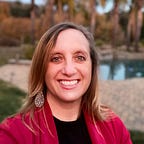Pinch Me, Am I Still in My Dream … Job?
It’s that time of year again when I celebrate my annual work anniversary at Santa Clara University School of Law. Maybe it’s just the law professor mentality taking its hold, but I have found that I enjoy taking this opportunity every year to reflect and reexamine. After all, I counsel students on a daily basis to choose a career that is in alignment with their values and goals. I should do the same.
Good news! This year I’ve concluded that I am *still* in my dream job, grateful that one of California’s oldest institutions of higher learning, and my alma mater, has given me this opportunity to work with the next generation of lawyers. And thanks to a faculty fellowship, I’ve come to realize that my work is synergistic with the goals of this Jesuit University located in the heart of Silicon Valley.
Last year, I was named a Bannan Faculty Fellow by Santa Clara University’s Ignatian Center for Jesuit Education. Through that fellowship I was invited to explore the history of Jesuit education and its connection to my work. I was skeptical at first as to whether my work in the Entrepreneurs’ Law Clinic (ELC) and Tech Edge J.D. (TEJD) related in any way to Jesuit principles of higher education. However, through reviewing Jesuit writings and engaging in faculty discussions, I realized that these programs embody the Jesuit principle of “Cura Personalis,” the tradition of caring for the whole person in a “radically student-centered” education.
My full essay was published in the Ignatian Center’s Explore Journal in December 2020. The takeaways are:
- The ELC and TEJD, being experiential learning opportunities for law students, advance the ability of law students to solve complex social problems by providing critical skills training;
- Students in the ELC are taught the entrepreneurial mindset, i.e. to view issues as opportunities for innovation, and to be problem-solvers for their entrepreneurial clients;
- ELC students are expected to hone multiple key competencies needed of an entrepreneur’s lawyer, including empathy, creative problem solving, teamwork, interpersonal skills, and initiative, which will serve them well for their lives and careers; and
- TEJD takes some of the ELC’s “radically student-centered” components one step further, where each student creates a customized career plan that aligns with their values and attitudes on the meaning of work and life.
The essay was written before the world went online and changed the nature of my job in ways that I could not have imagined. So, I would add the following reflections as the world begins to emerge from a global pandemic:
- From its inception in 2013, I designed the ELC to allow students to work remotely, engage with clients on video when more convenient or practical, and keep all files electronically. This model turned out to be crucial in allowing the clinic to seamlessly transition online, and equipped students with tools they could use when they were working and studying from home in 2020.
- Through the virtual version of ELC’s Entrepreneurs’ Legal Advising Clinics held on Saturdays, we’ve been able to provide free legal services to hundreds of startups and entrepreneurs by engaging attorney mentors and student volunteers with minimal cost.
- The virtual model for the TEJD has allowed us to introduce students to a much wider variety of attorneys and legal professionals than ever would be possible in real life, by eliminating a Bay Area commute to come to campus. This gives students even more perspectives from which to create their customized career plan.
I am now ready to finish this school year and prepare for the next, re-energized in my mission to deliver student-centered experiential education to my law students.
